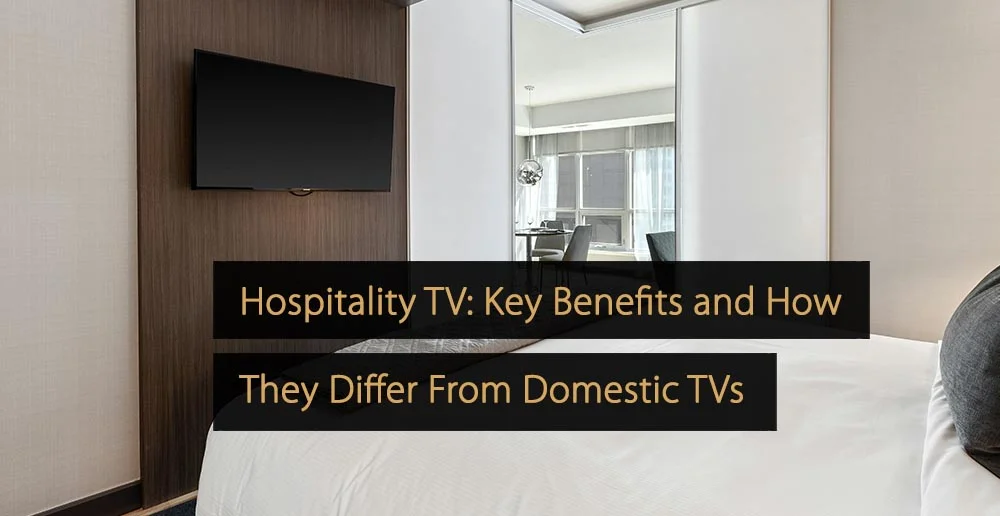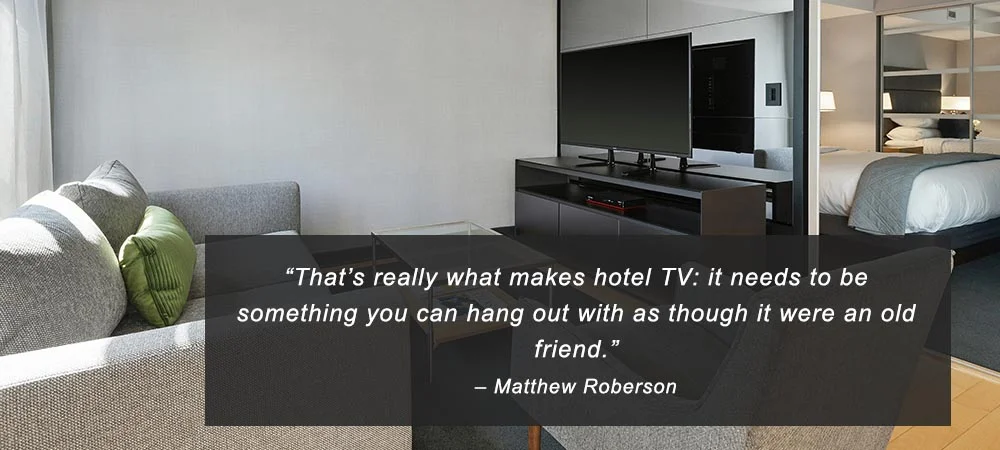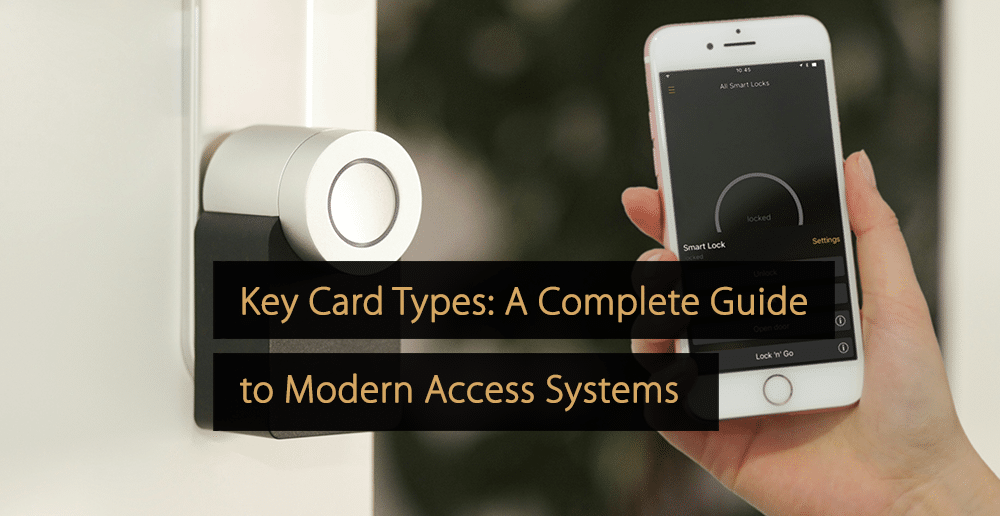Hospitality TV is the name given to the televisions found in hotels and similar businesses. These commercial televisions provide hoteliers with options like welcome messages, customization and enhanced data security. Acquiring a hospitality TV is important because the needs of customers in a hotel are different from the needs of individuals in their own homes. A hospitality TV allows you to provide relevant and appropriate guest services.
In this article, you will learn all about hospitality TVs, the key manufacturers and service providers, the major benefits, and the fundamental differences between a hospitality television and a domestic TV.
Table of Contents:
- What is Hospitality TV? A Brief Explanation of the Technology
- What Are the Main Benefits of Using Hospitality TV Services?
- What Do Guests Want and Expect From Hospitality TV Services?
- Exploring the Main Hospitality TV Settings
- Hospitality TV vs. Domestic TV – Exploring the Major Differences
- Best Options for Hospitality TVs
- How to Decide on the Best Hospitality TV Solution For Your Hotel
- Exploring Samsung’s Hospitality TV Offerings
- Understanding Smart Hotel Rooms
What is Hospitality TV? A Brief Explanation of the Technology
Hospitality TV is the use of TVs specifically designed for the hotel industry. These TVs can be used in guest rooms, but also in other areas of the hotel, like conference rooms and the hotel reception.
Hospitality TV provides hotels and similar businesses with a greater degree of control over what is displayed on televisions on their property. This can include welcome messages and promotional content. Hotels are also given a variety of customization options, allowing them to introduce branding and control which channels to provide.
In addition to the various hospitality TVs that may be set up throughout a hotel, a hospitality TV system is a centralized software solution, which provides control options for all connected television sets in the property.
What Are the Main Benefits of Using Hospitality TV Services?
A quality service will provide complete control over the television services and messaging displayed to guests. Hotels can choose which channels to offer and which promotional content to show.
Hospitality TVs also make use of a centralized control system. This software allows those operating in the hospitality sector to set up and make adjustments to the programming and messaging on TVs, and implement these changes across all television sets at the same time. As a result, there is no need to set up and customize each TV individually.
The ability for hospitality TVs to connect with each other makes them a key part of the modern smart hotel concept. The central control system allows hotels to easily prevent access to adult content and other unwanted programming. Television displays can also be used to communicate with guests, displaying announcements or recommendations.
What Do Guests Want and Expect From Hospitality TV Services?
They want technology that is easy to use and which provides them with entertainment. They also want options, including different channels and the ability to access services like Netflix.
While hospitality TV is an important example of hotel technology, providing valuable options for hoteliers, it is also a service that needs to be targeted towards guests’ needs. Most guests want the ability to access content on demand, and they want options to cast content from their phone, laptop, or tablet.
The television should be easy to turn on and simple to control. It should provide no major hurdles for users to clear in terms of accessing the content they want. It is also important to ensure there are systems in place to protect guests’ privacy and data security, so they are not left vulnerable after using your hospitality TV.
Exploring the Main Hospitality TV Settings
These TVs will typically include a customizable welcome message and an adjustable channel lineup. Remote management, power saving, and security features are also essential.
Many modern hospitality TV solutions will provide hotels with the ability to add a hotel channel to the channel lineup, which can be used to communicate with guests. USB cloning is standard in LG and Samsung hospitality TVs, in particular, allowing settings to be easily transferred from one TV to another.
Hospitality TV vs. Domestic TV – Exploring the Major Differences
Televisions used in the hospitality industry differ from those used in domestic settings in a number of significant ways. In the sections that follow, you can learn about these differences.
Hospitality TV Comes With a Warranty Covering Commercial Usage
A hospitality TV will have an extended warranty, which also covers commercial usage. Typically, this warranty will last at least two years and sometimes as long as five years, covering the cost of any repairs.
This is important because domestic televisions are typically sold with a standard one-year warranty, and this warranty does not cover commercial usage. If you use a domestic TV in a hotel and it fails, you will have to cover all repair costs.
It is Usually More Cost-Effective to Invest in a Hospitality TV
Hospitality TVs are engineered to be more robust and to last longer. In addition, many manufacturers and retailers will provide significant discounts on bulk purchases, because demand for hospitality TVs is lower.
Cost-effectiveness is a major benefit when investing in hospitality technology of this kind. Buying TVs that last longer and which are less prone to damage can pay off significantly over the long term.
Hospitality TVs Include Additional Privacy and Security Features
When guests access a TV, they may wish to log in to services like Netflix and Amazon Prime. However, with a domestic TV, this presents a possible security risk, as guests may forget to log out and clear their data.
With a hospitality TV, there are built-in security features, allowing hotels to reset all login information and clear all sensitive data upon check-out. Often, this can be set up to occur automatically, saving time and effort.
There Are Further Hospitality-Related TV Options to Explore
A dedicated hospitality TV provides additional options, such as customizable welcome screens. Volume control options also allow hotels to set a default volume that the TV reverts to when switched on, as well as a maximum volume.
The volume controls help hotels to prevent situations where other guests are disturbed by a TV being too loud. Moreover, eco-friendliness has emerged as one of the biggest hotel trends and energy-saving settings assist with these efforts.
Best Options for Hospitality TVs
A number of television manufacturers make dedicated hospitality TV sets. Below, you can learn about some of the best options, what they have to offer, and why they are highly rated.
Samsung Commercial TVs
Samsung Commercial TVs are dedicated hospitality TVs, with a variety of features not seen on consumer TVs. This includes a centralized content management solution and a two-year warranty.
Your guests will have the freedom to log in to their social media accounts and digital content services, while security features will keep their data protected and will remove it after they leave your hotel. Hotels can help to reduce energy costs by using the various eco-friendly features provided, including an automatic standby mode.
Video: Samsung 65” NT670U 4K UHD Smart Hospitality TV Review | Network Hardwares
LG Hospitality TVs
LG Hospitality TVs include customizable brand identity features, remote management options, and various other controls. All new LG hospitality TVs now also come with an extended three-year warranty.
The manufacturer has made a strong effort to keep pace with emerging hospitality trends, providing Netflix and Apple AirPlay integration, along with options to save energy and reduce costs. In addition to hotel TVs, LG also offers commercial displays intended for use on cruise ships, as well as extra bright options for outdoor areas.
Video: LG Hospitality Range & Pro: Centric Overview
Philips Hospitality TVs
Philips Hospitality TVs are powered by the Android operating system and allow hotels to set a personalized welcome screen for each guest. The company sells hospitality TVs for guest rooms, lobbies, and common areas.
These televisions have full access to the Google Play Store, making it quick and easy to add apps, including Netflix, Amazon Prime, and Disney Plus. Remote management tools allow the hotel to monitor the operational status of TVs and schedule content to display at specific times, for fully optimized communication.
How to Decide on the Best Hospitality TV Solution For Your Hotel
How do you decide on the best hospitality TV? It is important to start by making a list of the most essential features. This will allow you to explore options with a clear idea of what you are actually looking for.
It is essential to look at the obvious features of a TV, such as the display size and resolution, but you also need to think about hospitality-related features. Can you customize the welcome screen? Is there a centralized solution for managing multiple television sets? Does the TV have privacy and security features?
The price of the TV is always going to be a key consideration, but it is best to think about the total cost of ownership, usage, and replacement. This means factoring in the upfront price, durability, and warranty. There may also be options for leasing the TV or obtaining finance to cover the upfront costs if you are on a tight budget.
Exploring Samsung’s Hospitality TV Offerings
Samsung is one of the biggest television manufacturers in the world, and some of the top hotel brands use its hospitality TV offerings. Samsung TVs offer high-quality images and include a whole range of customization and control options, while providing an extended warranty that covers commercial use.
In the “Samsung Hospitality TV: Main Benefits, Key Features and More” article, you will be able to access much more information on what these television sets have to offer, how the related services work, and why hoteliers should consider buying Samsung TVs.
Understanding Smart Hotel Rooms
Hospitality TV is often a key feature in a smart hotel room, which is a room equipped with hotel technology that provides automated and personalized experiences. Examples of what you might expect to find in a smart hotel room include smart temperature controls, smart lighting and voice-controlled smart assistants.
In the article “Smart Hotel Room; What Are the Benefits for Hotel Owners and Guests?“, you can explore the topic in greater depth and learn how the smart room concept can be advantageous for everyone.
Hospitality TV services are provided by hotels to guests and differ from domestic TVs in the ways described. It is important to choose the right provider, offering the services you desire from your televisions. In addition to exploring offerings from Samsung, LG, and Philips, it is worth taking some time to explore more niche providers, too.
More Tips to Grow Your Business
Revfine.com is the leading knowledge platform for the hospitality and travel industry. Professionals use our insights, strategies, and actionable tips to get inspired, optimize revenue, innovate processes, and improve customer experience.Explore expert advice on management, marketing, revenue management, operations, software, and technology in our dedicated Hotel, Hospitality, and Travel & Tourism categories.
This article is written by:
Hi, I am Martijn Barten, founder of Revfine.com. With 20 years of experience in the hospitality industry, I specialize in optimizing revenue by combining revenue management with marketing strategies. I have successfully developed, implemented, and managed revenue management and marketing strategies for individual properties and multi-property portfolios.










Leave A Comment